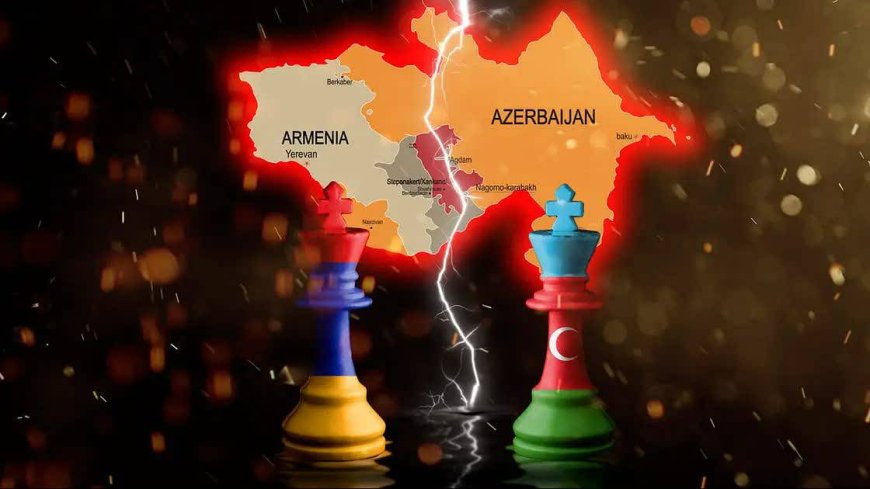Nagorno-Karabakh in the Crosshairs: Geopolitical Rivalries and Future Scenarios
The South Caucasus region holds immense geostrategic significance due to its abundant resources, including oil and gas reserves, particularly in the Caspian Sea, as well as its control over vital transportation routes between the East and West, and the North and South. Its vast oil and gas resources make it a crucial element in the energy strategies of regional and extra-regional powers seeking to assert dominance and control over the global energy market.

The presence of underground reserves, particularly fossil energy resources, in the South Caucasus region serves as a critical asset and a means for leveraging power in the global arena. Consequently, the United States and Russia find themselves engaged in a fierce competition to control energy resources and pipelines from the South Caucasus region.
In 1997, Sam Bruni, a member of the US Senate Foreign Relations Committee recognized the Caspian Sea as a new opportunity for the United States, emphasizing the significant interests the US holds in the countries of Central Asia and the Caucasus that surround this sea. As a result, the Caspian region, particularly the South Caucasus, is deemed of paramount importance to Washington.
Nagorno-Karabakh, a disputed mountainous region in the South Caucasus, is considered Russia's traditional sphere of influence. This region has long been entangled in the conflict between Armenia and Azerbaijan, prompting both the US and Russia to seek a role in its resolution.
Meanwhile, China has aligned itself with Russia as both nations strive to limit Western influence in the region. They support the idea of a Sino-Russian partnership to counterbalance US hegemony in this region. Consequently, a geopolitical competition has unfolded between the United States on one side and Russia and China on the other, vying for influence in the region over the past decades, with this competition expected to persist in the future.
However, Beijing's approach to the lingering dispute between Azerbaijan and Armenia has diverged. Beijing's political interests in the South Caucasus are largely indirect. While China opposes the presence of the United States in the region, it has shown no inclination to involve itself in resolving regional conflicts. It appears that China respects Russia's historic rights in its traditional backyard.
In recent years, the pro-Western Prime Minister of Armenia has opted to align Yerevan with the United States and NATO. Nikol Pashinyan organized an anti-Russian demonstration in Yerevan and conducted joint military exercises with the United States. In the recent escalation of tensions in Nagorno-Karabakh, he called for US intervention, which was not forthcoming.
The Kremlin, acting as a historic mediator between Armenia and Azerbaijan, has called for an immediate ceasefire and the implementation of the tripartite agreements reached in November 2020 between Yerevan, Moscow, and Baku. These agreements were formulated in response to a recent aggression by the armed forces of the Republic of Azerbaijan on Nagorno-Karabakh. This renewed onslaught underscores the shifting dynamics of the region and highlights the fact that unless the involved parties genuinely seek a resolution, no extra-regional party can facilitate a viable solution.
The objective of the West has been to disrupt the ethnic, racial, and demographic fabric of this volatile region. In an attempt to bring Armenia into submission, the West has been persistently working to undermine the peace talks platform between Armenia and Baku, which is hosted in Russia. With the support of Aliyev and Pashinyan, the West aims to dominate the Western platform in Europe and America, considering the mountainous region as Baku's territory.
The policies adopted by Pashinyan's administration, driven by unrealistic hopes for Western support, have gravitated towards implementing Western policies and making ill-advised decisions. This has endangered Armenia's national security and territorial integrity, posing a threat to its survival. As a result, the people of this region have been compelled to relocate, effectively enduring forced exile. It is important to acknowledge that the historical defeat of the people in this region stems from their alignment with the wrong side of history and their failure to resist.
In conclusion, it must be unequivocally stated that the events unfolding in this region are a dangerous occurrence orchestrated by external actors to disrupt the ethnic, racial, and demographic fabric. There is also a concern that the Karabakh region may become a gathering place for extremist terrorists. Additionally, if the United States establishes a military base in Armenia, it could potentially jeopardize the existence of Azerbaijan. Given these critical issues, the deployment of Russian peacekeeping forces in the region can partially contribute to the stability of Nagorno-Karabakh, benefiting both Baku and Yerevan.













































